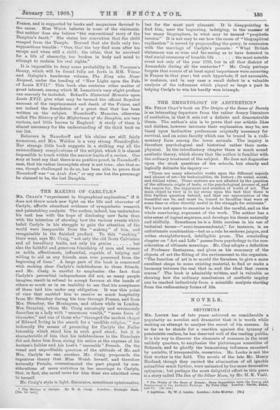THE MAKING OF CARLYLE.* Mn. CitAra's "experiment in biographical explication,"
if it does not throw much new light on the life and character of 'Carlyle, affords abundant evidence of sympathetic research and painstaking analysis. The author, indeed, has undertaken his task less with the hope of disclosing new facts than with the intention of showing bow the various events which befell Carlyle in his struggle to gain the attention of the world were inseparable from the " making" of him, and recognisable in the finished product. To this "making " there went, says 311.. Craig, "not only the old Scots Calvinism
and all hereditary traits, not only his genius but also the faithful and generous friendship of men and women as noble, affectionate, influential, capable of helping and willing to aid as any friends man ever possessed from the beginning of time." A large part of the book is concerned with making clear Carlyle's indebtedness to these friends, and Mr. Craig is careful to emphasise the fact that Carlyle's proverbial independence did not, as many people imagine, result in refusal to accept favours at the hands of others so much as in an inability to see that his acceptance of them laid him under any obligation. It was this point of view that enabled him to receive so much hospitality from Mr. Strachey during his tour through France, and from Mrs. Strachey, the Montagues, and others while in London. Mrs. Strachey, whom Mr. Craig amusingly and erroneously describes as a lady with "enormous wealth," "some force of character," and one of those who " thronged the modest chapel of Edward Irving in the search for a ' credible religion,' " was indirectly the means of procuring for Carlyle the Buller tutorship which stood him in such good stead; but it is characteristic of him that his indebtedness to the Stracbeys did not deter him from airing his satire at the expense of his hostess's foibles and his host's " execrable " French. On the vexed and unprofitable question of the attitude of Mr. and Mrs. Carlyle to one another, Mr. Craig propounds the ingenious theory that Miss Welsh herself, and therefore naturally Froude, overestimated the part played by con- siderations of more ambition in her marriage to Carlyle, that, in fact, she cared more for him than she admitted even to herself.
Mr. Craig's style is light, discursive, sometimes opinionative,
• The Braking of Carlyle. By T. N. Craig. Loudon Eyelet& Nash. [1Ms. CIL mit.] but for the most part pleasant. It is disappointing to find him, near the beginning, indulging, in the manner of too many biographers, in what may be termed "prophetic heroics." It is not easy to see bow the cause of " biographical explication" is served by propounding the query, in connexion with the marriage of Carlyle's parents "What British statesman was so wise and far-seeing as to have detected in that social ceremony of humble life the most notable event not only of the year 1795, but in all that district of Annandale during all the centuries P " Mr. Craig perhaps forgets that events of at least equal importance were occurring in France in that year ; but suoh hyperbole, if not excusable, is common, and in any case a small defect in a valuable analysis of the influences which played so large a part in helping Carlyle to win his hardly won triumph.






































 Previous page
Previous page